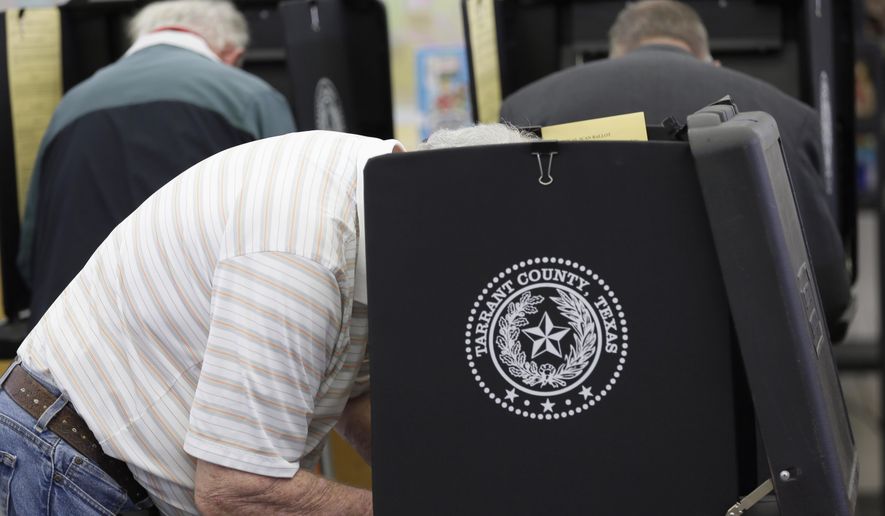Election officials in three states say they’ve received and rejected requests to have Russian diplomats present at polling places when U.S. voters cast ballots for their next president Nov. 8.
Russia’s consul general in Houston, Alexander K. Zakharov, outlined the requests in letters sent to election officials in Oklahoma, Texas and Louisiana that said he wished to deploy representatives “for a short period of time, when convenient,” with the “goal of studying the U.S. experience in organization of voting process.”
The requests were refused by all three states and addressed by the Obama administration Friday during press briefings at both the White House and Foggy Bottom.
“I think it is unclear exactly what the Russians were intending to do in this case. I think it’s appropriate that people might be suspicious of their motives, or at least their motives might be different than what they have publicly stated, given the nefarious activities that they’ve engaged in in cyberspace,” White House spokesman Josh Earnest said Friday.
“There’s nothing for us to fear from having Russian observers observing our election,” State Department spokesman John Kirby said at a separate briefing. “But those requests that go to the states are for the states to decide. We’ve got nothing to fear and nothing to hide from that.”
Recalling Russia’s decision not participate in election monitoring conducted by the Organization for Security and Co-operation in Europe, Mr. Kirby said “The fact that they have chosen not to join the OSCE mission makes clear this issue and the story are nothing more than a PR stunt.”
The secretaries of state for Oklahoma, Texas and Louisiana each outlined their reasons for rejecting the requests, according to responses published by their respective offices. Additionally, all three either directly or indirectly ban foreign observers from monitoring their elections, according to the National Conference of State Legislatures.
In Oklahoma, a spokesman for the State Election Board said state law prohibits anyone other than election officials and voters from lingering around polling places.
“We actually, very recently our office had visitors from France and ones from Switzerland, from the State Department and we gave them a presentation, we went over how our elections work,” the spokesman, Bryan Dean, told Oklahoma City’s KOKH Fox 25. “We showed them how our machines work and we did all that for them and I know Russia participates in that program as well, so we are perfectly willing to show what we can of our election system, but we can’t violate state law.”
“People should not worry about the integrity of our elections because it’s not just Oklahoma, the U.S. election system is the envy of the world,” he wrote the Russian consulate. “It is truly an amazing system.”
Texas Secretary of State Carlos H. Cascos cited a similar provision on the books in the Lone Star State in his response, and noted its a misdemeanor for anyone to enter a polling place without proper authorization — a warning later described as a threat by Russian media.
“We are unable to accommodate your request to visit a polling station; however, our office is available to discuss generally the election process or perhaps facilitate a meeting with local election officials in Harris County to go over the general process with your representatives,” he wrote in a Sept. 28 response, the Fort Worth Star-Telegram reported.
In Louisiana, meanwhile, Secretary of State Tom Schedler said he couldn’t honor Russia’s request on account of the catastrophic flooding that ravaged the Baton Rogue area in August.
“Had this flood event not occurred, we certainly would have been open to such a visit, but I cannot meet such a request with the situation I currently have in front of me,” he wrote.
A spokeswoman for Mr. Schedler, Meg Casper, described the request as a “propaganda ploy” and said the FBI and Department of Homeland Security had “told us not to do this,” USA Today reported.
Neither Reuters nor Associated Press reporters could reach the Russian consulate in Houston for comment Friday, but the Russian Embassy in Washington, D.C. said it was “baffled” by and “disappointed” in the states’ response, Politico reported.
“Overall, we are disappointed with the reaction of the U.S. administration, and, on top of that, with the unfriendly way it is currently portraying our desire to pursue normal diplomatic work in respectful contact with the authorities of the host country, which we hoped for,” the embassy said. “It is obvious that in this case our American colleagues are lacking transparency for this kind of work.”
Russia’s Izvestia newspaper quoted an unnamed diplomatic source with accusing Texas of violating “all principles of democracy and international monitoring” by warning that individuals caught at polling places without authorization can be held criminally responsible.
“Americans obstruct Russia’s attempts to monitor their elections because they see them as a threat. The refusal to allow Russian diplomats to perform their direct duties is a demonstrative violation of the 1961 Vienna Convention on diplomatic relations,” the head of Russia’s Central Election Commission’s department for international relations, Vasily Likhachev, told the newspaper.
On Oct. 9, the Obama administration issued an official statement formally blaming the Russian government with a rash of recent cyberattacks waged at various facets of the U.S. political system in an apparent effort to interfere in next month’s election. Russian President Vladimir Putin has denied the allegations, and instead accused Washington of blaming Moscow in order to manipulate public opinion.
The FBI said previously that it believed Russian hackers breached election systems in Arizona and Illinois in August. At least 33 states so far have asked DHS to help secure its polling systems prior to next month’s election, Homeland Security Secretary Jeh Johnson said earlier this month.
• Andrew Blake can be reached at ablake@washingtontimes.com.




Please read our comment policy before commenting.